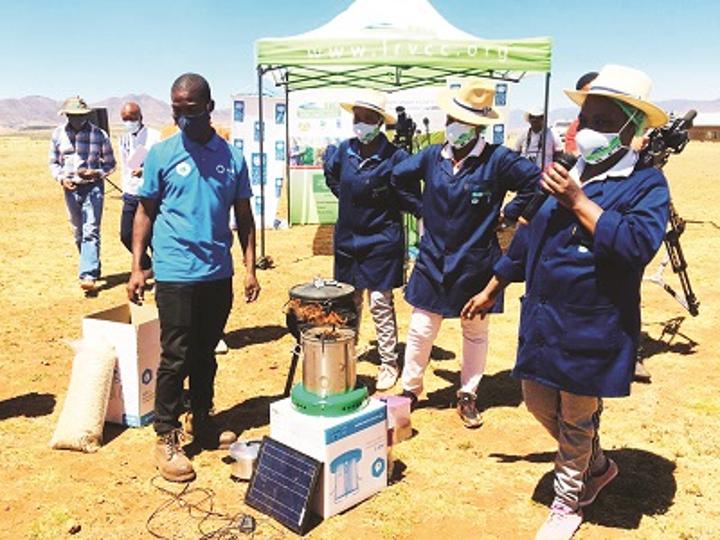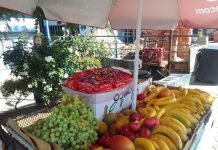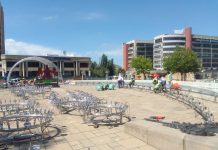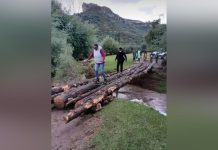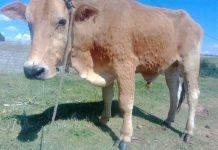Africa-Press – Lesotho. The United Nations Development Programme (UNDP) along with its partners handed over the energy efficient stove and the Cash for Assets to the community councils at
Phamong on Friday. Cash for Assets is a cash incentive afforded to the participating households, who are engaged in land management and smart climate initiatives under the auspices of UNDP, and
the cash is said to “complement” the participants for their efforts for sustainable management and use of natural resources for earning a living. The Cash for Assets
incentives are disbursed by the UNDP’s sister organisation, the World Food Programme (WFP). The energy saving stoves are environmental friendly stoves which use less biomass, fuel and wood.
They can also perform other functions such as charging cell phones and provide lighting in the house. They are powered by both electricity and solar energy.
Explaining the purpose of the event, the UNDP Resident Representative Betty Wabunoha said: “the activities of today demonstrate the benefits brought to the Community
Councils of Thaba Mokhele, Lithipeng and Khoelenya in the District of Mohale’s Hoek, all made possible by the funding from the Global Environment Facility
(GEF) through the project very well known in this community – ‘Reducing Vulnerability from Climate Change’ (RVCC). ” She further
highlighted that the project is envisaged to “promote resilience” against the effects of climate change. “This objective is only achievable through direct partnership with the relevant line ministries,
through strengthening, building and closing capacity gaps to better support and empower these communities. We aim to develop their skills to enable them to maintain their nature-based livelihoods
under the challenging climate conditions that cause subsequent vulnerabilities. “The project supports mainstreaming of Climate Change risks into land rehabilitation
activities and promotes alternative climate resilient livelihood activities to reduce pressures on the already fragile ecosystems. Therefore, I strongly
believe the incentive packages that will be handed over to the beneficiaries today are important inputs that will enable us to achieve the RVCC Project
objective,” Wabunoha said. The Resident Representative for UNDP, also applauded the government led initiatives which counter land degradation and rehabilitation of rangelands and management saying
such programmes cannot be “overemphasised”. “It’s important to note that the prevailing state of land degradation, coupled with the effects of climate change, is likely to worsen the situation if we don’t act now.
Therefore we need to continue joining hands, to achieve more during this remaining period of the Project and beyond. “The voluntary participation by the community members in the land rehabilitation works created community
ownership and has proved to be a sustainable approach that we should scale up country wide,” she appealed for extensive rollout of the project. Wabunoha went on to
emphasize the importance of capacity building initiatives for communities. “One of the important factors that contributes to sustainable land management, without
which these land rehabilitation efforts could not be recognized, is empowerment of the communities. It’s for this reason that the project initiatives focus on
capacity building through trainings, information sharing, solid partnerships and supply of critical inputs to the growth and sustainability of the community
livelihood. ” In their endeavors to promote healthy lifestyle amid the COVID-19 pandemic, she mentioned that UNDP has supported about 24 villages with clean running water systems, a move
which she reflected that it has come in handy as access to clean running water is one of the avenues to keep the virus at bay, as the disease requires the
regular practice of hygiene protocols through regular washing of hands and healthy environment. “The Project used the existing structure of the lead farmers to establish Farmer Field Schools,
which is now a platform for peer learning and an improvement of extension service at community level. “The Farmer Field Schools also facilitate empowerment of farmers through field based experiential
learning processes. There are around 59 Beekeeping farmers empowered by this project, who are already selling honey products and earning an income from it,”
she said. For sustainability of the project, the UNDP Resident Representative said the local authorities have been roped in and underwent capacity building exercises for management and
better coordination on land management through collaboration with the community councils. “Another aim of the project is to support the integration of climate change adaptation into
national and sub-national land use, planning and decision-making processes. It is key that all those involved in decision-making, consider the issue of
climate change mainstreaming into sectoral policies and community development plans. “The joint efforts of all levels of governance could go a long way in ensuring sustainability of
land rehabilitation efforts,” she remarked. In line with the October 17, an International Day for Eradication of Poverty, in which this year’s theme is: Acting together to achieve social and environmental justice
for all, Wabunoha appealed to participants to take pride in the work done. “Poverty is not solely an economic issue, but rather a multidimensional phenomenon that
encompasses a lack of both income and the basic capabilities to live in dignity” she reflected. Minister of Forestry, Range and Soil Conservation Hon.
Motlohi Maliehe said the Ministry tries by “all means” to ensure that the livelihoods are improved. He said, the stoves will save the beneficiaries’ time of gathering fuel.
Maliehe applauded the initiative. “Lesotho as a UN family member has ratified a number of Multilateral Environmental Agreements [MEAs] and Conventions.
The implementation of the Rio Declaration on Environment and Development in particular Principle 3 emphasizing that the right to development must be fulfilled so as to equitably meet developmental
and environmental needs of present and future generations, reaffirming that all our endeavors shall contribute to poverty eradication, inclusive equitable
economic growth and development, enhance ecosystem management, environmental health and human well-being,” he said. The Minister further said, “firewood is the most important energy source for cooking and
space heating in households within these three community councils around the project site. Consumption is particularly high, as the alternative sources of
fuel are either unavailable or unaffordable for the majority of consumers. Inefficient open fires used to cook household meals waste wood and exacerbate
health problems associated with indoor air pollution. “Women have to travel to the woodlands every day to gather enough fuel for their families. The fuel-saving stove consumes little firewood and reduces back and forth visits to
check on the food cooked, therefore allowing women enough time to perform other household duties around the home-stead. ” Reflecting on how the stoves will help beneficiaries, he remarked that, “the use of improved
fuel-efficient stoves are expected to reduce the use of biomass such as wood, crop waste, dung and reduce cooking time, and create significant household labor benefits”.
Land Rehabilitation Project Beneficiaries awarded a cheque of US$552, 969 approximately M9, 400, 473.00 One of the beneficiaries ‘Mapoloko Leteane registered appreciation for the energy
efficient stoves. Leteane said they volunteered as villagers, working on their land and their work had finally been recognized by the funders. A move, which she hailed as their success story.
Since 2017, they were controlling and removing brush from their communities land then, and did it voluntarily. The beneficiaries are set for M1, 800 remuneration after every three months.
Previously the participating households in the project received farming inputs, start-up packages for Income Generation Activities (IGAs) such as beekeeping equipment, traditional laying chickens, shade nets, hail nets and greenhouses. The programme is expected to run until 2022.
For More News And Analysis About Lesotho Follow Africa-Press

